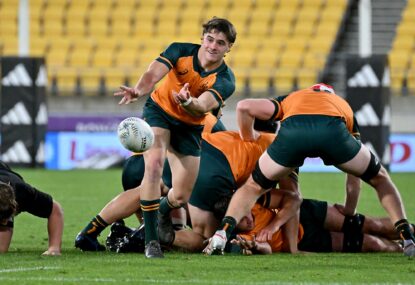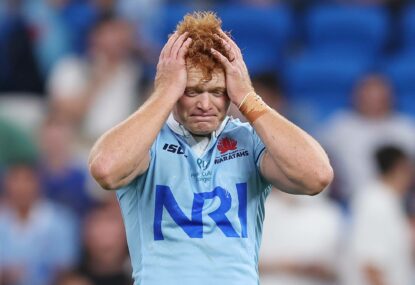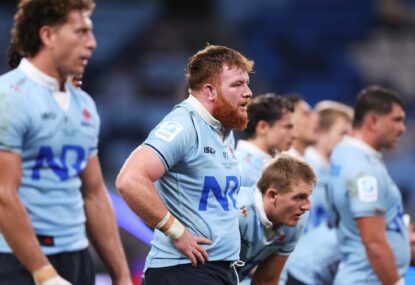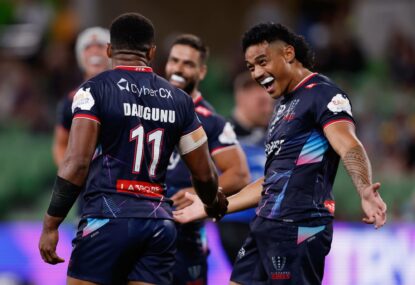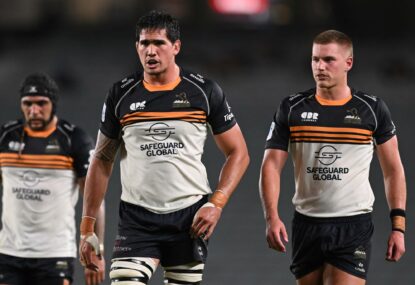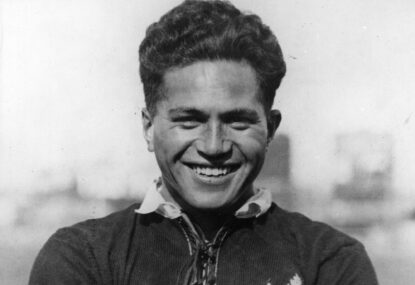With news reports freely available on the web, and the IRB rankings updated on a weekly basis, there are few Test results around the world which escape our attention. It’s easy to forget that this wasn’t always so.
Since England are currently basking in the glow of a good win over the World Champions, I thought it might be worth remembering a less impressive performance. There’s one very near-run thing in England’s rugby history of which even most English supporters are unaware.
International players may not spend much time outside World Cups playing unfamiliar, lower-ranked opponents today, but it was more common in the amateur era.
In 1979, the RFU sent a squad of 25 players out for summer tour of Japan, Fiji and Tonga (It was actually the first occasion a major rugby-playing nation visited Tonga).
My focus here is on the games in Japan. It wasn’t the first time England toured there. They did so back in 1971, the same year the Lions went to New Zealand.
The 1971 tour was part of the RFU’s centenary celebrations, and included matches in Hong Kong, Singapore and Sri Lanka (an unthinkable schedule for a top team today).
On that occasion, England struggled to overcome Japan in the first match, despite outscoring the home side five tries to two (tries were still worth four points). The match was level at 19-19 with three minutes to go before two late scores gave the visitors a 27-19 victory.
The second 1971 match was even closer. Neither side scored a try, but England crept out to a halftime lead of 6-0.
Japan then came back hard in the second half, getting three points of their own. One of the centres, Miyata, was tackled just three yards from the tryline but the visitors held out for a 6-3 win.
Japan were a useful side but by no means a regularly competitive international team. When they toured Wales in 1973, for instance, they fell to a heavy 62-14 defeat.
Nevertheless, The 1979 English tourists should have known from the experience of 1971 that their opponents were no pushovers on home turf. It was still the amateur era, and touring was as much about the social side as playing.
A visiting group of fit, young men distracted by the sights, sounds and sake of the East, could easily get the balance slightly wrong and come up short on the pitch.
None of the four international matches on this tour were given official Test status. Just as in 1971, England played as England XV, and awarded no caps, although I think their opponents probably did hand them out.
This was no England B team, however. Australians may not be familiar with the names but many of the squad – including Beaumont (captain), Wheeler, Rafter, Scott, Smart Carleton, Dodge, Slemen and Hare – went on to win the Grand Slam just nine months later.
The first game on the itinerary was a midweek run against Japan “B” in Tokyo, which the visitors won 36-7. The squad then headed west on the bullet train to Osaka to meet the national side.
When England took the field at Kintetsu Hanazono, it was their first confrontation with Japan’s full national side since that narrow three-point win eight years before.
There was one feature of this match which might look curious today. The referee was Welshman Clive Norling.
Why should a neutral referee be a surprise? It’s not the fact that Norling was neutral, it’s more that he was chosen by the RFU and was travelling alongside the England squad.
Few accounts of this match are in English but there are several in Japanese, including one from flanker Takeo Ishizuka, who sadly passed away in 2009.
Ishizuka said that he knew some of the names of the English squad but no-one ever did any real research on the opposition back then.
They might have had some videos from England but the different technical specifications meant they needed to be converted and no one wanted to spend the time or money doing so.
Ishizuka remembered his teammates being nervous before the match but not over-awed. Although wins were few and far between, Japan had started to face overseas opposition on a more regular basis, and the players were growing more accustomed to the experience.
Looking across at the England team, he thought they had skinny legs. Since that’s the part of the body his team would mostly be tackling, he thought Japan had nothing to fear physically.
England moved out to a 3-9 lead. In the 35th minute of the first half, Japan won a lineout and spread the ball wide. Full-back Tanifuji, making his debut appearance, came into the line but couldn’t collect the pass cleanly.
The ball went backwards, however, and the defence was briefly wrong-footed as Japan swept up the ball and attacked down the touchline. An overhead pass inside beat the covering tacklers and the Number 8 Kobayashi took it to crash over for a try.
The score was 7-9 and the flags went up for the conversion to make it 9-9.
No, that’s not what happened, The Japanese linesmen thought that the kick was successful, and raised their flags, but referee Clive Norling decided it had missed and overruled them.
Norling was to recall this decision during last year’s World Cup when he pointed out that Wayne Barnes could have overruled his assistants after James Hook’s penalty against South Africa was judged to have missed.
There was still time in the half for a penalty, awarded to Japan, and there was no doubting this one as the ball sailed between the posts. Japan took a one point lead into halftime.
Ishizuka recalled that the captain, winger Shigetaka Mori, didn’t bother saying anything technical in his team talk. It was a real blood and guts spiel, telling his team to keep putting their bodies on the line and get the win.
More importantly, he was making his appeal to a team which had grown in self-belief as the match had gone on.
Japan got the first points of the second half, a penalty pushing their lead out to 13-9.
At this point, England began to exert some control and won two penalties to take them to a 13-15 lead. Ishizuka described the next stage of the game as stalemate, with neither side able to mount any successful attacks. The home team’s heads didn’t drop but time was running out.
In the closing minutes of the second half, England were pressing on the Japanese goal-line. Ishizuka then found himself with turnover ball and his first instinct was to clear for touch.
His kick missed and was collected by an England player, who decided to run it back. Ishizuka went from thinking he was stupid to have kicked the ball away, to fearful that he might have just handed the opposition a gilt-edged chance to score.
The Englishman instead ran straight into a head-on tackle from second-rower Fukurodate, which succeeded in dislodging the ball. The Japanese captain was on hand to collect it, and he sped away towards the England line.
No one could catch him, and Mori touched down under the posts to put his team ahead. This time, there was no mistake with the kick and Japan led 19-15.
The Japanese match commentator began screaming that there was only a minute left on the clock. The capacity crowd were in uproar and Japan was on the verge of a famous victory.
Television cameras picked out England tour manager Budge Rogers looking distinctly sick at the near certainty that his team had lost.
The match had more than a minute left to run, however. Referee Norling decided to play three minutes of injury-time. To the home players and spectators, it seemed like a lifetime.
In injury time, England won a penalty. Since three points wasn’t even enough for a draw, they had no option but to run. They went for a move straight from the training ground, forwards taking the ball up before shipping the ball out to full back Dusty Hare.
Hare took the tackle from substitute winger Kudo but he got a pass away to Lions winger Peter Squires, who went over for a try to tie the scores at 19-19.
Hare was one of England’s finest goal kickers and had no difficulty claiming the win. Norling’s whistle blast after the conversion went over confirmed that England had escaped by the skin of their teeth. The crowd was stunned. Ishizuka recalled that no-one could quite believe the match had been lost.
Since this is an Australian site, if you want to imagine the scene, just cast your minds back to the 1991 World Cup.
Ireland scored a breakaway try to take a last-minute lead in the quarter final, only for the Wallabies to hit straight back through Michael Lynagh to claim the win in front of a packed Landsdowne crowd.
That’s probably not far off what happened in Osaka.
The England XV margin of victory was two points and it didn’t escape anyone that this was equal to the first half conversion which Norling had overruled.
I’ve never seen footage of the kick, so don’t know if the Japanese linesmen were definitely over-exuberant or if Norling chose to establish his authority on a much closer call.
Few today blame the referee for his decisions. It may have felt like injury time lasted an eternity but three minutes was not unusual in 1979.
In one of his last interviews, Ishizuka ruefully accepted the blame himself, saying it was his responsibility as a flanker to chase the restart and try to reclaim the ball.
Most of the players who represented Japan that day see this game as the one that really got away.
The teams met again the following week in Tokyo but it was something of an anti-climax and Japan went down 38-18. The English had their guard up by this time. It’s also likely that some of the Japanese players were still drained from the earlier defeat,
It’s tempting, when we look at rugby in the professional era, to talk about how more teams are now capable of taking games off each other.
We shouldn’t forget there were some close-run things in the amateur era too. Of course, if England had lost, it wouldn’t have counted as a Test defeat because they were playing as England XV.
When Japan did finally claim a major scalp at home, ten years later in 1989, it was a 28-24 victory over a Scotland XV which also didn’t count as an official match.
Mind you, that’s not how Japanese supporters remember it. They recall beating the country which went on to claim a Grand Slam the following year.
And then they wince with the memory of how they almost managed to do the same in 1979.





























































































